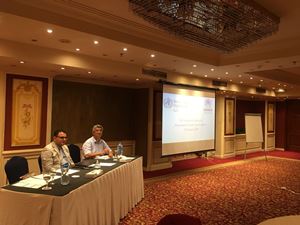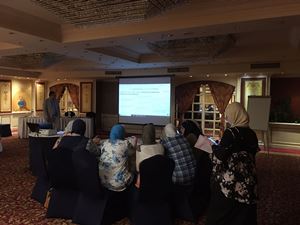 WHO country office for Egypt in collaboration with the UN Refugee Agency (UNHCR) organized 2 days training of trainers (TOT)’s workshop on Best practices of Safety injection, on 5th and 6th August, 2018 in Giza.
WHO country office for Egypt in collaboration with the UN Refugee Agency (UNHCR) organized 2 days training of trainers (TOT)’s workshop on Best practices of Safety injection, on 5th and 6th August, 2018 in Giza.
The workshop aimed achieving the following goals: strengthening the capacity of senior infection control practitioners for injection safety, and implementing it at their respective health institutions. In addition, raising the awareness of the participants towards injection safety by training and providing the information needed. The participants were from health care facilities who support refugees, and humanitarian work in Egypt, and worked together in groups, in order to exchange their experiences in a practical and fruitful way.
Currently, 208,398 refugees and asylum seekers of 63 different nationalities have been registered by UNHCR/ Egypt and received health care services through different NGOs foundations. 1.7 million People were infected with HBV, and 315,000 were infected with HCV and 33,000 were infected with HIV through unsafe injections, in 2010.
It is worth mentioning that safe injection practices are intended to prevent transmission of blood-borne pathogens between one patient and another or between a patient and a care provider and to prevent injuries such as needle sticks.
 WHO stresses on the need to reduce the number of unnecessary injections as a critical way to reduces risk as well as safe injection practices as a part of standard precautions to assure that injections are performed in a safe and healthy way for the patient and care provider, and community.
WHO stresses on the need to reduce the number of unnecessary injections as a critical way to reduces risk as well as safe injection practices as a part of standard precautions to assure that injections are performed in a safe and healthy way for the patient and care provider, and community.


